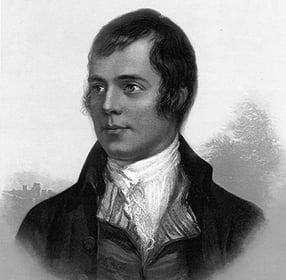Winter: A Dirge
The wintry west extends his blast,
And hail and rain does blaw;
Or, the stormy north sends driving forth
The blinding sleet and snaw:
While, tumbling brown, the burn comes down,
And roars frae bank to brae;
And bird and beast in covert rest,
And pass the heartless day.
“The sweeping blast, the sky o’ercast,”
The joyless winter-day
Let others fear, to me more dear
Than all the pride of May:
The tempest’s howl, it soothes my soul,
My griefs it seems to join;
The leafless trees my fancy please,
Their fate resembles mine!
Thou Power Supreme whose mighty scheme
These woes of mine fulfil,
Here, firm, I rest; they must be best,
Because they are Thy will!
Then all I want—O do Thou grant
This one request of mine.—
Since to enjoy Thou dost deny,
Assist me to resign.
This poem is in the public domain. Published in Poem-a-Day on December 18, 2022, by the Academy of American Poets.
“Winter: A Dirge” was most likely written during the winter of 1781–82, during Burns’s residence in Irvine, North Ayrshire, Scotland. In a preface to the poem included in the first published collection of Burns’s poetry, Poems, Chiefly in the Scottish Dialect, known better as the Kilmarnock Edition (John Wilson, 1786), Burns describes the “peculiar pleasure” he takes in the season of winter. “This, I believe, may be partly owing to my misfortunes giving my mind a melancholy cast,” he writes, prefiguring Wallace Stevens’s dictum that “One must have a mind of winter / To regard the frost and the boughs / Of the pine-trees crusted with snow” in his poem “The Snow Man.” Burns continues, “There is scarcely any earthly object gives me more—I don’t know if I should call it pleasure, but something which exalts me, something which enraptures me, than to walk in the sheltered side of a wood or high plantation in a cloudy winter day, and hear a stormy wind howling among the trees and raving o’er the plain.” In “‘Wish’d, Wint’ry, Horrors’: The Storm in the Eighteenth Century,” published in Comparative Literature vol. 19, no. 1 (Winter 1967), former professor of French literature at Trinity College, Dublin, and Reading College, England, Christopher Thacker writes that Burns’s feelings about the winter storm, far from contempt for the unpleasant weather, represent a “direct experience of the sublime, the poet in immediate contact with the storm.”

